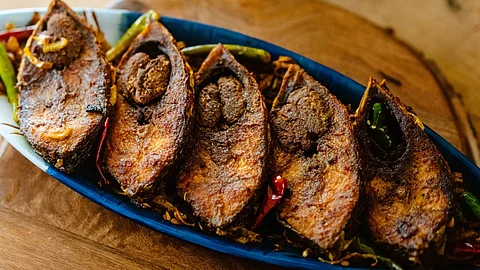
- HOMEGROWN WORLD
- #HGCREATORS
- #HGEXPLORE
- #HGVOICES
- #HGSHOP
- CAREERS
- ABOUT US
- CONTACT US

Can a fish foretell the state of diplomatic relations between two countries?
The answer, however unlikely, is: yes, it can.
A Brief History Of Fish-y Diplomacy Between India And Bangladesh
In 1996, Sheikh Hasina, the former Prime Minister of Bangladesh, gifted Hilsa — or Ilish, as we call it in Bangla — to the then Chief Minister of West Bengal Jyoti Basu just before the landmark Ganges Water Sharing Treaty was signed between India and Bangladesh. It marked a new chapter in India-Bangladesh bilateral ties after years of tension between the two countries due to opposing Cold War-era alliances in the 1980s.
Since then, Sheikh Hasina has used Ilish as an instrument for fostering better bilateral relations between India and Bangladesh many times over the years. In 2017, the former Prime Minister of Bangladesh gifted Ilish to the former President of India Pranab Mukherjee in a diplomatic gesture to resolve the long-standing Teesta River water-sharing dispute between India and Bangladesh; and in 2023, the fish diplomacy between the two countries reached its peak with a shipment of 5,000 tonnes of Ilish coming to India from Bangladesh during Durga Pujo.
Barring the pandemic years between 2020 and 2022, the amount of Ilish traded between India and Bangladesh has been a bellwether for the state of diplomatic relations between the two countries. Whenever there has been an increase in tension between India and Bangladesh over border disputes or water-sharing treaties, the amount of Ilish being traded has decreased; whenever diplomatic relations have improved, there has been an increase in the amount of Ilish entering India from Bangladesh.
A New Era In India-Bangladesh Diplomatic Ties
This year, however, was a break in that tradition.
After the August Uprising in Bangladesh led to the ouster of Sheikh Hasina, the interim Government led by Nobel Peace laureate economist Muhammad Yunus imposed a ban on the export of Ilish — the national fish of Bangladesh — to keep domestic prices under control.
Bangladesh is the world’s largest producer of Ilish, accounting for almost 80-90% of the global catch, and with four to five million Bangladeshis directly and indirectly involved in commercial Ilish fishing, the industry contributes to more than 1 percent of the country’s GDP. India, which produces only 5 percent of the catch, is the largest importer of Bangladeshi Ilish, with West Bengal consuming a majority of the import.
Naturally, there was outrage in West Bengal over the sudden ban. Eventually, the Bangladeshi Government had to overturn the ban, allowing up to 3,000 tonnes of Bangladeshi Ilish to be exported to India during Durga Pujo. A crisis had been averted. But these sudden changes point to a departure from the established tradition of fish diplomacy between India and Bangladesh, and a new, uncertain era of bilateral ties between the countries.
The Place Of Ilish In Bengali Culture And Politics
Rich without being fatty, delicious, albeit bony, Ilish is central to the collective culinary and cultural identity of Bengalis across India, Bangladesh, and elsewhere. The fish is such an important part of Bengali culture that a pair of Ilish is presented to the Goddess as ritual offering during Durga Pujo. Ilish is also an essential part of Bengali wedding feasts — symbolising joy, abundance, and wealth for the newlyweds.
The expensive fish (currently priced at 1500 Rupees per kg in Kolkata, 4 times costlier than the other Bengali staple Catla) is considered a marker of upward social mobility by many Bengalis. Ilish is not simply a fish. It is a cornerstone of Bengal’s collective cultural identity — so deeply intertwined with 'Bangaliyana' or Bengaliness, that it is virtually impossible to imagine one without the other. From films to music, and art to literature, there are few things as essential as Ilish is to Bengali life and culture. I could go on and on about Ilish, but I'm going to leave you with a song instead:
If you enjoyed reading this, here's more from Homegrown:
The Secret Of ‘Maachh-er Tok’: A Light, Sweet & Sour Bengali Summer Fish Stew
Stirring Up Memories: How My Nani’s Iconic Kakdi-chi-bhakri Recipe Connects Me To Her Legacy
How Digital Recipes Are Keeping South Asian Culinary Legacies Alive In the Modern Age
